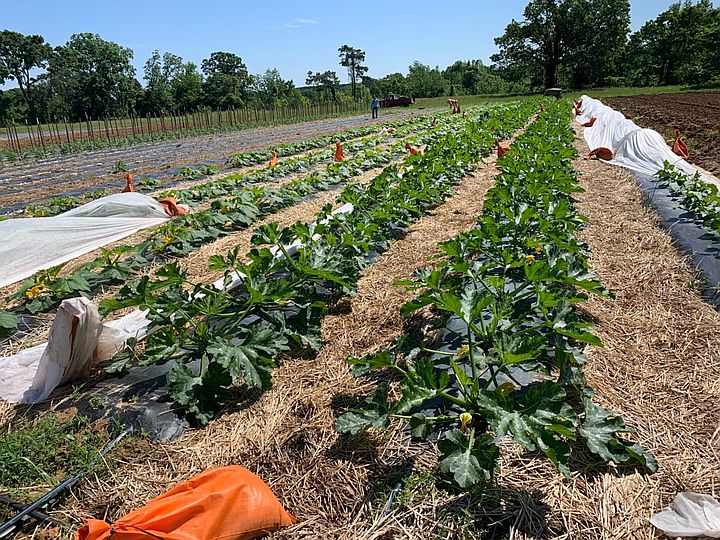Small Shares
- Cabbage
- Yellow Squash
- Cucumber
- Rainbow Chard
- Sweet Basil
- Sweet Onions
Full Shares
- Cabbage
- Yellow Squash
- Cucumber
- Rainbow Chard
- Sweet Basil
- Sweet Onions
- Eggplant
- Zucchini
This week is the last of the cabbages! They have all been harvested. It is your last chance to make some Tubby Creek sauerkraut until fall, when the cabbages and other cool season brassicas return. These will probably be the last cucumbers for a while … our first planting performed magnificently but round two had some problems with cucumber beetles. The beetles spread a bacterium that causes the plants to wilt and die before they can produce fruit. Even though we have the cucumber beetles under control now, the damage has been done! More cukes have been planted, so hopefully we will have more in July. The eggplant has just started producing. Small shares should be getting some next week. Lots more potatoes will be coming soon, and more carrots, and we have started picking cherry tomatoes but it seems like they are taking forever to get rolling!
Acres and acres of plastic
On June 7th, NPR came out with a story about the use of plastic mulch on organic vegetables farms. Many people do not know that the use of plastic mulch in agriculture is the norm when it comes to growing vegetables, organic and conventional alike. The main reason for using plastic mulch is weed control. Here at Tubby Creek Farm, we use a biodegradable plastic mulch. At the end of the season, we turn it into the soil where it breaks down. Traditional plastic must be removed from the field and sent to a landfill.
As the NPR story points out, the use of bioplastic mulch is controversial. The biodegradable product we use is allowed for organic producers in Canada and Europe. But it is not currently permitted for USDA Organic farms. It is, however, permitted for Certified Naturally Grown, which is the certification that we hold. It is one of very few differences between the National Organic Program and Certified Naturally Grown standards. Why the discrepancy? You can read more about CNG’s position here.
What we do
Where, when and why do we use (bio)plastic mulch? At Tubby Creek farm, we use in our “summer” garden. These are the crops that are planted after a danger of frost has passed. They include tomatoes, peppers, eggplant, okra, sweet potatoes, squash, cucumbers, cantaloupe and a few others. We do not use plastic mulch in the spring and fall gardens. On the whole, we use plastic mulch on about 40% of the beds we use in a given year.
Plastic mulch makes weed control easier, but it is still just one part of a comprehensive weed control strategy. We still have to control weeds in the pathways between the beds, which we do by laboriously laying down straw mulch. Some weeds, like Johnson grass and nut sedge come up through plastic (and probably concrete, too). Hand weeding is still necessary at the base of plants and along the edges of the beds. In the spring and fall gardens we use silage tarps and flame weeding as our primary weed control strategies. In the high tunnels we use landscape fabric. That is plastic, too, but it gets used many times over.
Summer vacation?
The NPR story got me thinking. What would our farm look like if we couldn’t use biodegradable plastic mulch? We would probably not grow some of the summer crops that take up a lot of space. I am thinking of okra, winter squash, and sweet potatoes, for example. We’d grow a lot fewer tomatoes. We would probably focus on spring and fall, when we are already making do without plastic mulch, and possibly do more throughout the winter. What summer planting we did would be delayed so that we could flush out the weeds using tarps and flame weeding. We’d probably use more landscape fabric (again, it’s still plastic). Maybe we’d expand our production of perennials like blueberries and blackberries.
Farmers want real solutions
I hope that Certified Naturally Grown continues to allow its growers to use biodegradable plastics. I hope that the National Organic Program follows suit. Plastic use on farms is a big problem. The bioplastic has its downsides. It is not as robust and may start breaking down while you still hope it is suppressing weeds! Compared to conventional plastic, it is thin and difficult to work with. It is a bit more expensive and is considerably harder to find. And it’s not just plastic mulch. It’s greenhouse film and irrigation lines, too. But it’s not a problem that individual farmers should be asked to solve. It’s a problem that calls for development of appropriate technology so that there are options that allow farmers to be better stewards of the environment and be profitable businesses at that same time.




You must be logged in to post a comment.